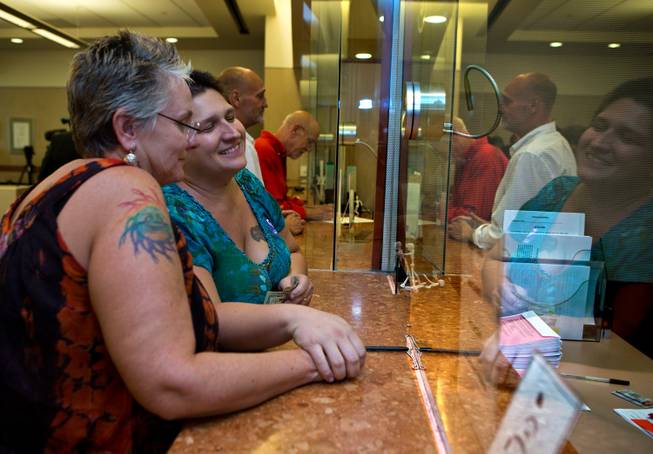
Tara Traynor and Cathy Grimes finally make it to the front of the line to receive their marriage certificate from the Marriage License Bureau on Thursday, Oct. 9, 2014, in Las Vegas.
Monday, Nov. 10, 2014 | 11:10 p.m.
WASHINGTON — When a three-judge panel of the federal appeals court in California struck down bans last month on same-sex marriage in Idaho and Nevada, it was no surprise. The panel included two of the court’s leading liberals.
A group opposing same-sex marriage said the composition of the panel was also no coincidence. In an unusual accusation in a recent court filing, the group said the two judges served on a disproportionate number of cases involving gay rights.
The odds of this were 441-1, according to a brief filed by the group, the Coalition for the Protection of Marriage. It asked the U.S. Court of Appeals for the 9th Circuit to rehear the Nevada case “to cure the appearance that the assignment of this case to this particular three-judge panel was not the result of a random or otherwise neutral selection process.”
Peter Renn, a lawyer with Lamba Legal, which represents the plaintiffs in the Nevada case, said, “This conspiracy theory is more believable as the plot to a John Grisham novel than a credible legal argument substantiated by evidence.”
“Holding a losing hand does not mean that the deck has been stacked,” he said. “This conspiracy theory is frivolous and sad, and it reeks of desperation. It is embarrassing that the other side has stooped to attacking the integrity of our federal judiciary, rather than accept their loss with an ounce of grace.”
The 9th Circuit has 29 active judges. Since 2010, the coalition’s brief said, the court has heard 11 gay rights cases. Judge Marsha S. Berzon sat on five of them, and Judge Stephen Reinhardt on four. Eighteen of the court’s active judges served on none.
“Something is amiss,” the coalition told the 9th Circuit.
Peter H. Irons, an emeritus professor of political science at the University of California, San Diego, questioned the group’s selection of cases and noted that the decisions of panels including Berzon and Reinhardt were not uniformly in favor of gay rights.
“The allegation of panel rigging based on a supposed statistical analysis is completely bogus and totally unsupported by any facts,” he said.
Renn echoed the point.
“If there was a conspiracy, it apparently wasn’t a very good one,” he said, “given that the accused judges voted against the lesbian and gay litigants in a full third of the cases deemed suspicious by the other side.”
Monte Neil Stewart, a lawyer for the coalition, said that “the legal test here is one of appearance” and that “the appearance of panel-packing in the Nevada and Idaho marriage cases is strong.” He added that his client had posted a document on its website “addressing misunderstandings.”
Cathy A. Catterson, the 9th Circuit’s top administrator, said panels were indeed created at random. And that process, she said, takes place long before particular cases are assigned to panels.
“We just literally sent out the panel assignments for all of 2015,” she said last week. “They have no idea what cases they’re getting.”
Until recently, though, the court used a different procedure for assigning cases on a fast track, like the marriage case. They were assigned to the available panel with the most senior presiding judge, said the 9th Circuit’s chief judge, Alex Kozinski. Reinhardt, who was appointed by President Jimmy Carter, is one of the most senior active judges and so was disproportionately likely to be the presiding judge.
That procedure was changed to ensure “more randomness,” Catterson said.
Kozinski said the court’s staff had used a neutral principle in assigning the expedited cases.
“Having worked with our staff in San Francisco for three decades,” he said, “I have full confidence in their professionalism and objectivity.”
Still, if the Nevada coalition’s charge is that the 9th Circuit actively rigged the process, its evidence is quite thin.
At the same time, a new study by two law professors supports the idea that many federal appeals courts are not selecting their panels perfectly randomly.
“We found strong evidence in the majority of circuits that they’re not using a random assignment process to form their panels,” said Marin K. Levy, a law professor at Duke and one of the study’s authors.
The study considered more than 10,000 three-judge panels that heard arguments in federal appeals court over five years, comparing the real ones to 3 billion randomly generated artificial panels.
Adam S. Chilton, a law professor at the University of Chicago and the study’s other author, said there was only a 2 percent probability that the real panels were generated by pure chance.
He said one court’s practices are particularly questionable.
“If any of the 12 circuits are using a nonrandom process,” he said, “it’s most likely to be the 9th Circuit.”
Levy and Chilton were not looking at the same question as the group in the Nevada case. They explored how panels were composed, not how cases were assigned to panels.
Whatever the reasons, the study shows, the mix of judges on 9th Circuit panels does appear to be the product of something other than pure chance.
That is notable, Chilton said, given other research showing that the political affiliations and backgrounds of judges can help predict their votes.
“We know for a fact that the composition of panels affects the outcomes of cases,” Chilton said. “The reason we’re OK with this is because the process is supposed to be perfectly random.”

Join the Discussion:
Check this out for a full explanation of our conversion to the LiveFyre commenting system and instructions on how to sign up for an account.
Full comments policy